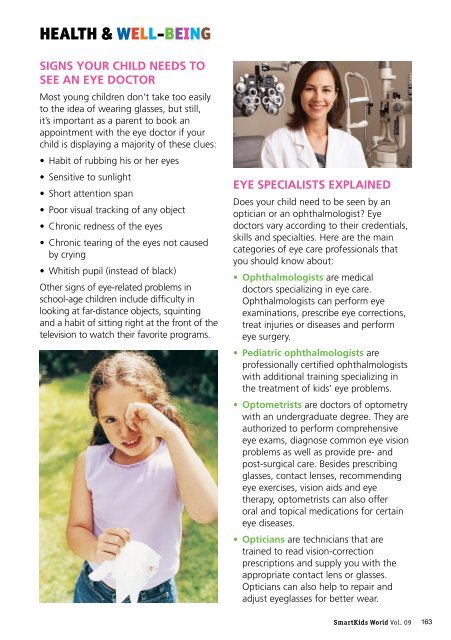SKW ENG V09
Create successful ePaper yourself
Turn your PDF publications into a flip-book with our unique Google optimized e-Paper software.
HEALTH & WELL-BEING<br />
Signs Your Child Needs To<br />
See An Eye Doctor<br />
Most young children don’t take too easily<br />
to the idea of wearing glasses, but still,<br />
it’s important as a parent to book an<br />
appointment with the eye doctor if your<br />
child is displaying a majority of these clues:<br />
• Habit of rubbing his or her eyes<br />
• Sensitive to sunlight<br />
• Short attention span<br />
• Poor visual tracking of any object<br />
• Chronic redness of the eyes<br />
• Chronic tearing of the eyes not caused<br />
by crying<br />
• Whitish pupil (instead of black)<br />
Other signs of eye-related problems in<br />
school-age children include difficulty in<br />
looking at far-distance objects, squinting<br />
and a habit of sitting right at the front of the<br />
television to watch their favorite programs.<br />
Eye Specialists Explained<br />
Does your child need to be seen by an<br />
optician or an ophthalmologist? Eye<br />
doctors vary according to their credentials,<br />
skills and specialties. Here are the main<br />
categories of eye care professionals that<br />
you should know about:<br />
• Ophthalmologists are medical<br />
doctors specializing in eye care.<br />
Ophthalmologists can perform eye<br />
examinations, prescribe eye corrections,<br />
treat injuries or diseases and perform<br />
eye surgery.<br />
• Pediatric ophthalmologists are<br />
professionally certified ophthalmologists<br />
with additional training specializing in<br />
the treatment of kids’ eye problems.<br />
• Optometrists are doctors of optometry<br />
with an undergraduate degree. They are<br />
authorized to perform comprehensive<br />
eye exams, diagnose common eye vision<br />
problems as well as provide pre- and<br />
post-surgical care. Besides prescribing<br />
glasses, contact lenses, recommending<br />
eye exercises, vision aids and eye<br />
therapy, optometrists can also offer<br />
oral and topical medications for certain<br />
eye diseases.<br />
• Opticians are technicians that are<br />
trained to read vision-correction<br />
prescriptions and supply you with the<br />
appropriate contact lens or glasses.<br />
Opticians can also help to repair and<br />
adjust eyeglasses for better wear.<br />
SmartKids World Vol. 09 163

















